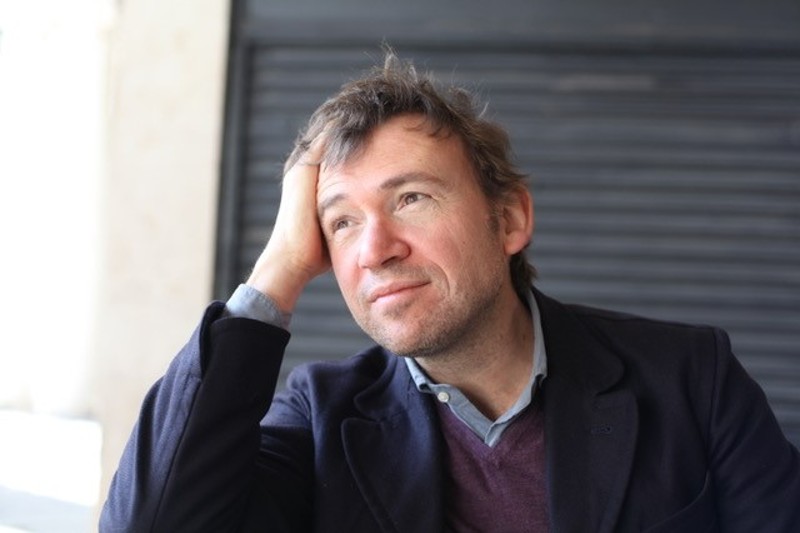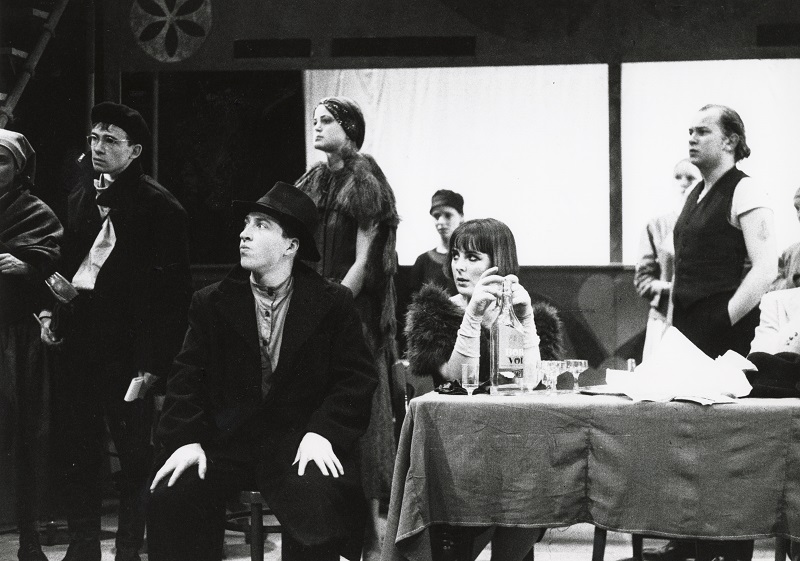
David Nicholls (BA 1988, Hon DLitt 2016) is an internationally renowned novelist and one of the UK’s most successful screenwriters. His five books include the bestselling novel One Day which he adapted into a film in 2011 starring Anne Hathaway, and Starter for Ten which he adapted into the 2006 film starring James McAvoy and Rebecca Hall.
Among his notable screenplays, he has adapted Edward St Aubyn’s Patrick Melrose novels, Thomas Hardy’s Far from the Madding Crowd and Tess of the D’Urbervilles and he has a Netflix series coming out this year based on One Day. Having graduated from the University of Bristol with a Theatre and English degree in 1988, David returns to his university to speak to Theatre and Film & TV students, and shares some remarkable insights into a fascinating career.
Growing up I always thought I would do something scientific. It wasn’t until my A-Levels, when I was studying English Literature, Drama, Physics and Biology, that I thought maybe I could continue acting. I had been in a lot of school plays, and I found the thought of leaving it behind awful. So, I applied to study English and Theatre at university.
I didn’t understand the premise of university. I didn’t know anyone who had been, and I had never expected to go myself. It was unnerving to think about studying something so vocational and my parents found it quite alarming – they didn’t think I’d be able to get a job as a Theatre graduate.
I was very naïve when I arrived in Bristol. I was so taken aback by the complicated ideas and wonderful work, and I had never been to the theatre before. I’d not really been a regular theatre-goer – TV and film were more my thing – and I loved the experience of putting on plays, even if I’d really not seen that many.
When the time came to graduate, I was at a bit of a loss. Some people leave university with such drive and ambition, but I didn’t have that – it took me a long time to get a sense of what I wanted to do. I wasn’t committed to acting in the way some of my peers were, partly because I wasn’t very good at it! I got another scholarship to study musical theatre at an all-singing, all-dancing school in New York, which was an eccentric move for someone who did neither of those things! When I came back to London in the early 1990s, I worked at the box office at Battersea Arts Centre, I got some small acting roles, and I spent a lot of time unemployed. It was an uncertain time.
I realised I loved creating a character, more than I did performing one. A turning point came when I was 27 years old and I was offered two roles – one was to understudy for a part in Twelfth Night at the Royal Shakespeare Company, and the other was as a script reader for BBC radio. I chose the latter, and finally decided to give up acting for good.
It’s important to hold onto some confidence because establishing yourself is a journey. I sold my first piece of writing to the BBC for £300 when I was 28 years old. I didn’t write full time until I was 31, and I didn’t finish a novel until I was 37. It can take a long time to find your voice, your subject and the world you want to convey but if you can hold onto a certain amount of confidence without being conceited or complacent, you can go a long way.
No one has a greater right to a job or a role than you do. Try to find within yourself the confidence to show and share your work. Be buoyed by the people around you – I am hugely grateful to the friends I met, most of them at university, who encouraged me to send my work to literary departments and told me to stop acting and keep writing. Stay in touch with friends who will support and nurture and collaborate with you.

Reading as much as I could was essential to establishing myself as a writer. I realised I couldn’t really write for the stage – my writing voice was more mainstream – so I embraced my love of television. I didn’t attend any writing courses, but I read and read and read – as a script reader I was reading 5-8 scripts a week, which gives you a sense of what does and doesn’t work on the page. It helps you find your own point of view, your own humour – what it is that will make you unique and interesting to other people. I read everything I could, and I watched everything too.
I chose to write a novel because I had two TV shows that were cancelled. I had one show on the BBC and one on ITV. They were both critically well received but neither were commissioned for a second season. It was a real crash, especially because they aired at the same time. Suddenly I had nothing to do.
There’s terrific freedom in writing prose. In screenwriting, if you’re not sure how to end something or the tone isn’t working, there are too many people who will talk to you about it! It’s an intensely collaborative experience and there are lot of restrictions – budget, running time, genre. Fiction is entirely solitary. It can be very lonely, and difficult to sustain the confidence to get words on the page, but the plus side is you have complete artistic control.
Prose for me is rooted in autobiography. None of the books I’ve written are directly autobiographical, but my own experiences do act as a catalyst. Of the novels I’ve written I’m most proud of the last three – One Day, Us and Sweet Sorrow – a trilogy of love at different ages.
You get so much from casting. My novel Us is about a man who is in love with his wife and son but is incapable of expressing it. In fiction you have access to memory and inner monologue, and you can move fluidly through time, so I could demonstrate his good intentions on the page. But how can you do that on screen without speeches, apologies, and confessions? You get a really good actor. Tom Hollander plays the part, and you can see it in this eyes – his desperate desire to express himself.
Adapting your own work is hard. You have the memory of what it took to write the original piece and you want to keep hold of bits that just don’t work for screen. My novel One Day is currently being adapted for a new Netflix series with a team of different writers – I’ve only written one of the episodes. Having an outsider’s eye is a good and refreshing thing. It’s like a cover version – it’s the same song, with a different voice.
Being at university was the central event of my life. It was entirely life-changing, but I wouldn’t have been able to go were it not for the full student grant I received. I’m passionate about access to arts education for everyone and I set up The Nicholls Arts Bursary in the hope that the financial support can ease some of the burden and encourage future Theatre students to apply for the course.
David’s top tips for writing:
- Keep a mood board. I always have a document where I record ideas, sketches of dialogue, similes, metaphors, factual research – a scrapbook that I can add to anytime.
- Have touchstones of inspiration. You should always be aware of things that you want to emulate and aspire to. Read, read, read and watch, watch, watch.
- Write everything. Write your characters lives, their intentions, their inner lives. It will be time well spent, even if you don’t end up using it.
- Print out your work. Putting it into a different medium changes everything. I always edit on paper.
- Read your work out loud to yourself or friends. Again, changing the medium will change your perception of what you’ve written.
- Always keep to deadlines. It will make you a better person to work with.
- Read the scripts of TV shows or films you love. Read the scripts against the image and it will help you acquire the language of screenwriting – you’ll see what has been taken out, cut, moved, rearranged.
- Find your champions. The support of friends or a writing community is invaluable.
You can read more information on the University’s Department of Theatre here, and the Department of Film and Television here.

One day series was indeed a moving experience- thank you
What did the author study at university? Greeting : IT Telkom
This article will assist the internet people for
setting up new website or even a blog from start to end.
Now I am going away to do my breakfast, once having my breakfast coming
yet again to read additional news.
As a successful writer, what is one piece of advice David Nicholls would give to young writers who may also be struggling to find their direction or purpose?
Visit us Telkom University
Thanks designed for sharing such a pleasant thinking,
article is pleasant, thats why i have read it entirely
You actually make it seem so easy along with your presentation but I to find this matter to be really something that I feel I might never understand.
It sort of feels too complicated and very huge for me. I am taking a look forward in your
next post, I will try to get the cling of it!
Keep this going please, great job!
The Private Instagram Viewer is a reachable tool intended to allow you anonymously study public Instagram profiles without logging into your own account.
Whether you’re impatient virtually a username, desire to see someones profile characterize in full size,
or check out their bio and public posts, this tool makes it
fast and private.
Hi, i read your blog from time to time and i own a similar
one and i was just curious if you get a lot of spam remarks?
If so how do you stop it, any plugin or anything
you can advise? I get so much lately it’s driving
me crazy so any assistance is very much appreciated.
Incredible story there. What happened after? Thanks!
reinsurance industry outlook
This is really interesting, You’re a very skilled blogger.
I have joined your rss feed and look forward to seeking more of your excellent post.
Also, I have shared your site in my social networks!
thanks for info.